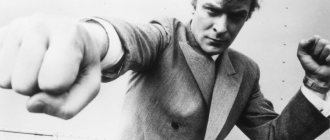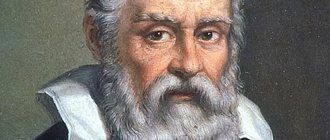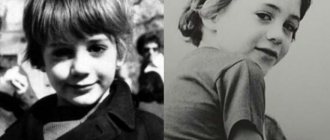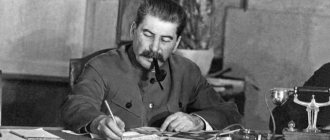Movies
Leonid Gaidai made his film debut in 1955, and as an actor. Leonid Gaidai played Alyoshka in the comedy “Lyana”. But Gaidai’s acting biography did not work out, which cannot be said about his work on the other side of the camera. A year later, Leonid Gaidai makes his directorial debut and releases the dramatic film “The Long Way”. The film was personally noted by the famous Mikhail Romm, who somehow, in pure drama, managed to consider the makings of Gaidai the comedian. It was Romm who advised Leonid Iovich to take a closer look at the humorous genre.
Then Gaidai released the satirical film “The Groom from the Other World,” because of which he almost lost his career. After censorship, barely half of the film remained, but even after such a merciless cutting, the aspiring director was prohibited from filming. Then Gaidai made a deal with Mosfilm for the first and last time: he made an ideological drama about the ship “Thrice Risen,” thanks to which he was allowed to continue working. But the director of this film himself was shy until the end of his life.
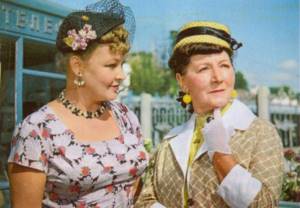
"Groom from the Other World"
In 1961, he made the short films “Dog Barbos and the Unusual Cross” and “Moonshiners,” which brought all-Union fame not only to the director, but also to the trinity of characters Coward, Dunce and Seasoned, performed by Georgy Vitsin, Yuri Nikulin and Evgeny Morgunov.
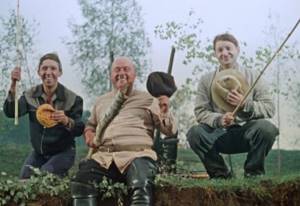
"Dog Barbos and an unusual cross"
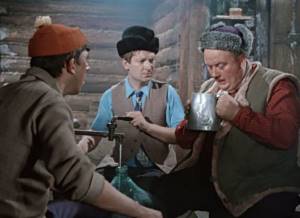
"Moonshiners"
Having filmed several short stories by the American humorist O'Henry in the film "Business People", Gaidai returns to Soviet reality and gives the audience one after another the immortal films "Operation "Y" and other adventures of Shurik", "Prisoner of the Caucasus, or New Adventures of Shurik", " The Diamond Arm”, “Ivan Vasilyevich is changing his profession”, “It can’t be!”. These films became the face of Soviet cinema for subsequent generations.
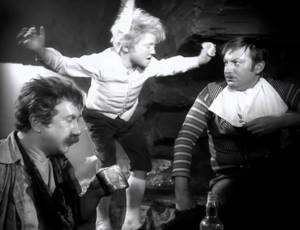
"Business people"
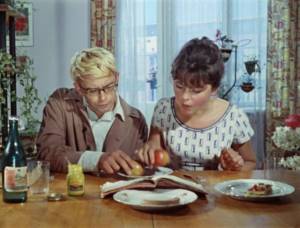
"Operation Y and other adventures of Shurik"
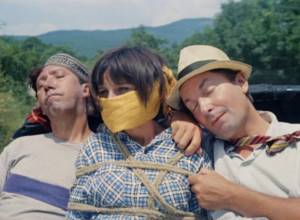
"Prisoner of the Caucasus, or New Adventures of Shurik"
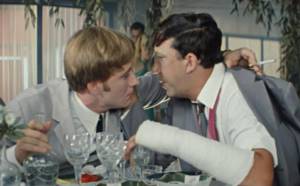
"The Diamond Arm"
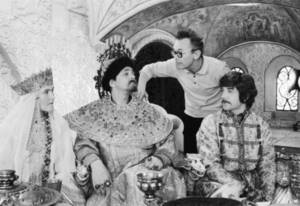
“Ivan Vasilyevich is changing his profession”
In the 1970s, the director again turned to literature, but this time to his native one. Leonid Gaidai filmed the classic works of Russian authors: Ilya Ilf and Evgeny Petrov, Mikhail Bulgakov, Mikhail Zoshchenko and Nikolai Gogol. This is how another diamond appears in Leonid Gaidai’s collection: the famous comedy “12 Chairs”.
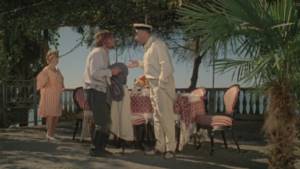
"12 chairs"
By the way, Leonid Gaidai himself often appeared in small episodes in his films. His biggest role was as archivist Varfolomei Korobeinikov in “12 Chairs.” In the 80s, the director made another classic comedy, “Sportloto-82,” and also directed many of the episodes of the film anthology “Wick.”
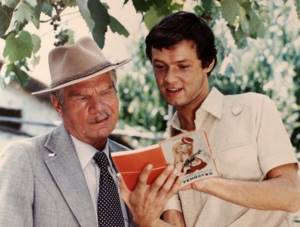
"Sportloto-82"
In 1989, Leonid Gaidai received the title of People's Artist of the USSR.
The last works of the great Leonid Gaidai were the perestroika films “Private Detective, or Operation Cooperation” and “The Weather is Good on Deribasovskaya, or It’s Raining on Brighton Beach Again,” in which Dmitry Kharatyan played the main role.
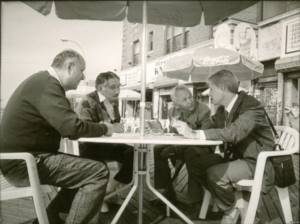
“The weather is good on Deribasovskaya, or it’s raining again on Brighton Beach”
It is worth adding that the legendary director was very conservative in the selection of the cast. Most of the artists starred with him many times. For example, Georgy Vitsin, Victor Uralsky, Sergei Filippov and Nina Grebeshkova appeared in his films about 10 times. Gaidai also loved working with Natalya Krachkovskaya, Alexander Demyanenko and Leonid Kuravlev.
Also a recognizable detail of the films were the songs sung by the characters in the films. Thanks to the appearance in Gaidai’s films, “The Song about Hares”, sung by Yuri Nikulin’s hero in “The Diamond Arm”, “People are losing each other” from the royal feast in “Ivan Vasilyevich changes his profession” or “Bears are rubbing their backs on the earth’s axis”, became cult thanks to the appearance in Gaidai’s films. which the main character of the film “Prisoner of the Caucasus, or Shurik’s New Adventures” sings.

Born on January 30, 1923 in the Amur province, in the city of Svobodny. A few months after the boy was born, the father moved his wife and three children to Chita, where he got a job in the city railway department. They stayed in this city for seven years, then moved to Irkutsk, where Leonid, the youngest child in the family, entered a railway school. As a child, he was not distinguished by exemplary behavior, but he actively participated in school amateur activities, performed with the railway workers’ club, and enjoyed reading poetry.
In 1941, Gaidai got a job as a stagehand at the Irkutsk Regional Drama Theater. He worked on all the performances of the Satire Theater, which was evacuated from the capital. In February 1942, the young man was drafted into the army. He graduated from the regimental school and was appointed squad commander. At the front, he was blown up by an anti-personnel mine, was seriously wounded and recognized as a disabled person of the 2nd group. Returning to Irkutsk in 1944, Leonid entered the theater studio. The aspiring actor was quickly noticed: with his spectacular performance in episodic roles, he overshadowed the main characters. In 1949, he entered the VGIK directing department, in the workshop of Grigory Alexandrov. The young man stood out among the applicants. However, already in his first year, an unpleasant incident occurred to him: due to a bad joke, he found himself on the verge of expulsion, and he had to make a lot of efforts to stay at the university.
While studying, Leonid met Nina Grebeshkova, who became his lifelong companion and performed many supporting roles in almost all of her husband’s films. The couple had a daughter, Oksana.
As a student, Gaidai starred in several films, but from the mid-50s he completely switched to directing. In 1956, his first film, “The Long Path,” was released, based on the Siberian stories of V. G. Korolenko. The next film, “The Groom from the Other World,” almost put an end to Leonid’s career: the satire on bureaucrats was harshly criticized by officials. The next film, “Thrice Risen,” was strikingly different from the director’s entire work, and the bright patriotic mood looked unnatural.
In 1961, Gaidai shot a 9-minute film “Barbos the Dog and the Unusual Cross,” which was inspired by Stepan Oleynik’s feuilleton in the Pravda newspaper. The short film was a resounding success and gave birth to three heroes, who later appeared more than once in Gaidai’s films and won the love of the audience. The images of the Coward, the Dunce and the Experienced became household names and appeared again in the next work, “Moonshiners”, then migrated to the trilogy “Operation “Y” and other adventures of Shurik”, the leader of film distribution in 1965, and later to the musical comedy “Prisoner of the Caucasus” , or Shurik’s New Adventures.” Another “nomadic” character, an eccentric student with glasses, was called Vladik, but the censor saw an analogy with Lenin, and Shurik was born.
In 1968, a film was released that was recognized as Gaidai’s best film - the crime comedy “The Diamond Arm”. The main role was created specifically for Yuri Nikulin, and Andrei Mironov was invited to play the role of Gesha Kozodoev instead of Georgy Vitsin. A KGB officer was assigned to the film crew. In order to minimize censorship interference in the script, Gaidai resorted to a trick: he captured a powerful nuclear explosion at sea, which he did not want to be cut from the final version. When the inspection commission inquired about the meaning of the episode, he presented the explosion as a symbol of the difficult international situation and the evil of imperialism. Representatives of Goskino agreed to leave the film without significant changes, provided that Gaidai excludes the explosion scene. The film was included in the top five films of the Soviet film distribution, and the characters' lines immediately became quotable.
In 1971, his best work, according to the director, was released: a film adaptation of the novel “12 Chairs” by Ilf and Petrov. The most difficult part was finding the leading actor. More than twenty famous actors took part in the auditions, but the role was given to the unknown Archil Gomiashvili. In 1973, another comedy, “Ivan Vasilyevich Changes His Profession,” was released, based on the play by Mikhail Bulgakov. Shurik appeared here again, but in the role of an engineer-inventor working on the creation of a time machine. In 1973, the film was watched by more than 60 million viewers. Gaidai’s last notable work was the film “The weather is good on Deribasovskaya, or it’s raining again on Brighton Beach.”
Leonid Gaidai died in Moscow on November 19, 1993.
Personal life
Leonid Gaidai met his future wife, actress Nina Grebeshkova, at VGIK - the girl was his classmate. They got married in 1953 and lived together for 40 years. By the way, the director was upset that his wife refused to officially take his last name, but Grebeshkova explained her refusal by the fact that it was not immediately clear whether a man or a woman was hiding under the name Gaidai, but for the actress this is important.
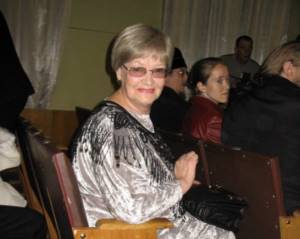
The family had a daughter, Oksana, who later gave Leonid and Nina a granddaughter, Olga.
Personal life of Leonid Gaidai
In the life of the famous director there was only one beloved woman - actress Nina Grebeshkova. Their wedding took place in 1953, after which the couple lived together for 40 long years, until Leonid’s death. The couple had one daughter, who was named Oksana.
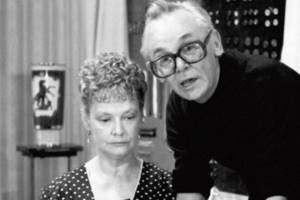
In the fall of 1993, Leonid Iovich was diagnosed with pneumonia. The director spent some time in the hospital, and on November 19 his heart stopped. The cause of death was a detached blood clot that blocked the pulmonary artery.
Leonid Gaidai is a filmmaking genius who left behind a huge number of cult films.
Main photo: @andrey_mironov1941
Death
In recent years, Leonid Gaidai has been very ill. He had a non-healing wound on his leg, and then, due to his addiction to smoking, the director began to have respiratory problems. In 1993, the director fell ill with pneumonia and was hospitalized, where he died from pulmonary embolism. He was buried at the Kuntsevo cemetery in Moscow.
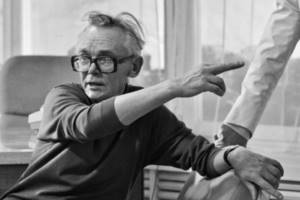
In memory of Leonid Gaidai, a cinema in the director’s hometown of Svobodny, Amur Region, was named after him, and a monument to the director was erected. The largest cinema in Irkutsk was also named after Gaidai, and there is a beautiful memorial plaque on the house where the film director grew up. Also, memorial plaques appeared on the school where the film director studied, on the building of school No. 49, where in 1943-1944 the director was treated in the hospital located in this school during the war, and on house No. 5, building 1 on Moscow Chernyakhovsky Street, where Leonid Gaidai lived after moving to Moscow.
In Perm in 2010, a monument to Leonid Gaidai appeared - the sculptural composition “Coward, Dunce and Experienced”, consisting of three famous heroes of the film director who moved from film to film, was installed in front of the Kristall cinema. The three comedy heroes are depicted in full growth, in motion, without a pedestal, so they blend into the crowd when people gather around the cinema.
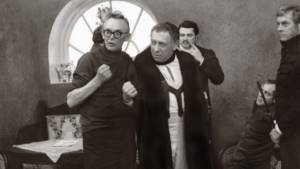
After 2 years, a similar composition was opened in Irkutsk. But here, in addition to the famous trinity of Coward, Dunce and Experienced, Leonid Gaidai himself was also present in the director’s chair.
They haven’t forgotten about the legend of Soviet films in Moscow either - one of the squares on the territory of the Mosfilm film studio is named after Leonid Gaidai.
Entire filmography
Director
- 1989-Private detective, or Operation "Cooperation"
- 1985-Danger to life!
- 1982-Sportloto-82
- 1979-For matches
- 1977-Incognito from St. Petersburg
- 1975-It can't be!
- 1973-Ivan Vasilyevich changes profession
- 1971-12 chairs (1971)
- 1968-The Diamond Arm
- 1966-Prisoner of the Caucasus, or New Adventures of Shurik
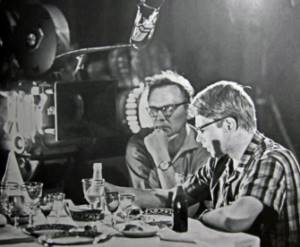
- 1965-Operation “Y” and other adventures of Shurik
- 1962-Business People
- 1962-Moonshiners
- 1961-Dog Barbos and an unusual cross
- 1958-Groom from the Other World
Actor
- 1971-12 chairs (1971)
Screenwriter
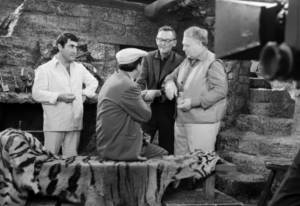
- 1989-Private detective, or Operation "Cooperation"
- 1985-Danger to life!
- 1982-Sportloto-82
- 1979-For matches
- 1977-Incognito from St. Petersburg
- 1975-It can't be!
- 1973-Ivan Vasilyevich changes profession
- 1971-12 chairs (1971)
- 1968-The Diamond Arm
- 1966-Prisoner of the Caucasus, or New Adventures of Shurik
- 1965-Operation “Y” and other adventures of Shurik
- 1962-Business People
- 1962-Moonshiners
- 1961-Dog Barbos and an unusual cross
What prevented Leonid Gaidai from moving forward?
For those who want to learn more about this cult director, the best director of Soviet eccentric comedies, Yevgeny Tsymbal’s documentary “Leonid Gaidai: From Funny to Great” (2001) will be a good help. In the film you will meet more than two dozen people, from Yuri Nikulin and Natalya Varley to Anatoly Papanov and Nonna Mordyukova. That is, those who came into close contact with Leonid Iovich during the filming of his films.
Gaidai is a front-line soldier. Excellent knowledge of the German language determined the future director’s choice of military profession: he ended up in intelligence. I had a chance to visit different bindings. After he once threw grenades at an enemy firing point and directly took part in capturing the “tongue,” Gaidai received the medal “For Military Merit.”
The war ended for him after being seriously wounded and undergoing long treatment in the hospital. He almost lost a leg. Much later, decades later, this wound made itself felt more than once.
Gaidai came to cinema through the theater. Even before the war, he was a stagehand at the Irkutsk Drama Theater; after demobilization, he graduated from a theater school, became an actor, and played many quite serious, non-comedy roles. Among them is Ivan Zemnukhov in The Young Guard.
After graduating from the VGIK directing department, he ended up at the Mosfilm film studio. His talent as a comedian was discovered in him by the already very famous and talented teacher Mikhail Romm. It was he who suggested this path to the aspiring director.
The first resounding success came with the release of two short films: “Barbos the Dog and the Unusual Cross” and “Moonshiners.” It would seem that the total running time is only half an hour - and what a violent reaction from the audience, what an instant fall in love with this trinity that quickly became iconic - the Coward, the Dunce and the Seasoned.
In this cast, they will participate twice more in the filming of Gaidai: in “Operation “Y” and other adventures of Shurik” and in “Prisoner of the Caucasus.” But first, the director will still have time to please the viewer with three film novels based on the works of O. Henry - all of them are included in one film “Business People”.
And many consider Gaidai’s “calling card” to be his “Diamond Hand”. It is no coincidence that in 1995, viewers recognized it as “the best Russian comedy in 100 years.” Alas, this recognition came when the director had already left.
By the way, Gaidai himself considered another one of his best films – “12 Chairs” based on the immortal work of Ilf and Petrov. Which many film critics attribute rather to the unsuccessful work of the director, giving preference to the same film directed by Mark Zakharov. However, this is just the opinion of film critics, right?
Like all talented people, Gaidai was not a “simple” person. In the same “12 Chairs” it was initially assumed that Vladimir Vysotsky would play Ostap Bender, and they had even already started filming. But the actor went on another binge - and... was removed from the role.
Or another episode. By the end of the filming of “Prisoner of the Caucasus,” Morgunov came to the next screening while drunk, began to defy the director, and the last frames in the film were played by his stunt double. And Gaidai promised to never film Morgunov again. And he kept his word.
By the beginning of the 90s, audience interest in Gaidai's new films was becoming less and less. It would seem that the person still had enough strength and experience to work. And character. It is no coincidence that in one of his last interviews he said the phrase: “We must move forward.” But it just didn’t work out “forward”. Why?
Time has changed. One country ceased to exist - the one with which Leonid Iovich’s entire creative biography is connected - and another was born. Quite another. The heroes of the director’s new works (“Life-threatening!”, “The weather is good on Deribasovskaya, or It’s raining on Brighton Beach again,” “Private detective, or Operation Cooperation”) were still comical, the stunts were funny, but... Perhaps , the country simply had no time for sincere, cheerful laughter “from Gaidai”?
The usual eccentricity for the director was replaced by sharp socio-political... no, not even satire - an angry denunciation: we again began to “overthrow to the ground”, once again to build a “new world”. What kind of laughter is there with the naively touching Goonies and Shuriks...
In addition, Gaidai’s health became increasingly weaker. In 1993, Inin and Volovich brought him their script for a new comedy and were extremely surprised to hear from the always energetic and efficient Leonid Iovich this: “Guys, I probably won’t be able to…”.
He died in November of the same 1993, in one of the Moscow hospitals. It all started with pneumonia. The cause of death of Leonid Gaidai was a pulmonary embolism. What it is?
The main problem is blood clots that block the pulmonary artery or its branches. When these blood clots are not very large in size, they can dissolve quite quickly. But larger clots inevitably lead to necrosis of the lung tissue, which threatens pulmonary infarction. And sudden death.
What are the symptoms of pulmonary embolism? If it has not yet reached the point of pulmonary infarction, the only symptom may be shortness of breath. Tachycardia, chest pain when taking a deep breath, and a feeling of anxiety are also possible.
Of course, there is already a reason to see a doctor. Especially if, in addition to all of the above, fainting, dizziness, convulsions, moist rales, and blood in the sputum begin.
How to save a person with a pulmonary embolism? This is only possible in stationary conditions. If this disease is suspected, emergency doctors try to transport the patient to the hospital as soon as possible. And already there, doctors begin to intensively support the patient’s respiratory functions, administer special thrombolytic drugs, and use anticoagulants. Their main task is to maximize blood circulation in the vessels of the lungs.
If medication methods do not help, surgical intervention is also possible. As a rule, the doctor has very little time.
There is a saying: “A German goes to the doctor two years before the onset of the disease, a Russian – three days before death.” How I wish our compatriots would fall less in line with this sad joke...
With the question “Is it possible to protect yourself from a disease such as pulmonary embolism? If so, how? We turned to Alexandra Olegovna Ivanova, a cardiologist, specialist in management and quality control of medical care at the CDC of the Expert Group of Companies.
Doctor's answer:
Pulmonary embolism is a poorly predictable disease, in the vast majority of cases it is a complication of another condition. Most often, pulmonary embolism is caused by heart disease; malignant tumors, venous diseases, and complex operations can also be provocateurs. In healthy women, the disease can occur during pregnancy. Also, the risk of pulmonary embolism is higher in all people who smoke and are obese.
Regardless of the disease, the task of the attending physician is to monitor such an indicator of blood clotting as D-dimer. Pregnant women, for example, take it several times during the entire observation period.
Its increase will clearly indicate to the doctor that there is a “breakdown” somewhere, although a person may subjectively feel good and not notice a deterioration in his condition. This is precisely the danger of pulmonary embolism; the changes preceding it are practically not felt by a person. For this reason, it is extremely important to visit your doctor at least once every six months and monitor your D-dimer levels.
The greatest danger is the presence of a congenital pathology of the blood coagulation system, which may not manifest itself for a very long time. At best, a person may not find out in his entire life that he even has such a pathology. In the worst case, he may suddenly develop a pulmonary embolism against the background of complete well-being.
In order to identify congenital changes, doctors prescribe a study of certain indicators, such as protein C, protein S, antithrombin, plasminogen and others. If deviations are detected, be sure to consult a doctor.
